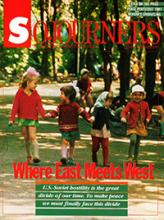Leo Tolstoy, as a child, was told by his older brother Nicholas that there was a green stick buried at the edge of a ravine in the ancient Zakaz Forest in the heart of Russia. It was no ordinary piece of wood. Carved into its surface were words "which would destroy all evil in the hearts of men and bring them everything good." Though never searching for the green stick itself, Tolstoy spent his life searching for its revelation. As an old man he wrote, "I still believe today that there is such a truth...."
I doubt if this green stick, were we to dig it up, would provide a text never read before. Would it not, in fact, be something we have heard again and again but which - in the practice of life - lay buried on the edge of a remote ravine within ourselves, where it wouldn't trouble us too often? I mean these words of Jesus, as recorded by Luke: "Love your enemies, do good to those who hate you, bless those who curse you, pray for those who abuse you...As you wish that others would do to you, do so to them" (6:27-31). It is a much ignored patch of the gospel.
Also in Luke's gospel (10:29-37), a lawyer asks Jesus the question, "Who is my neighbor?" The neighbor, it turns out, is an enemy of the questioner: a Samaritan. The chief villains in the story are respectable people who live in the best part of town, the very people the lawyer must have thought of as his neighbors.
For Jesus the question "Who is my neighbor?" is glued to the question "Who is my enemy?" Still more profoundly, it is connected to the question "Who must I love, and what does it mean to love?"
Read the Full Article

